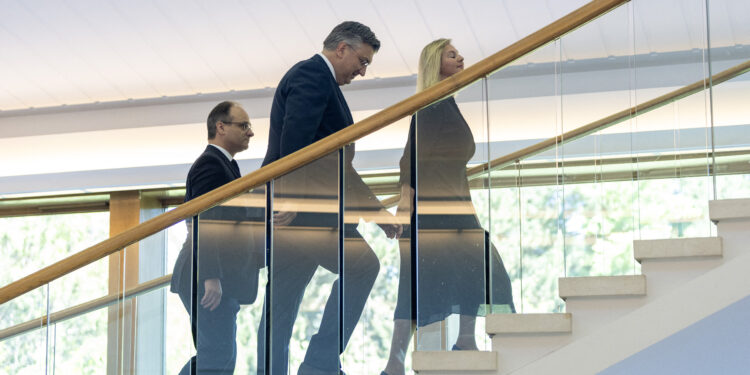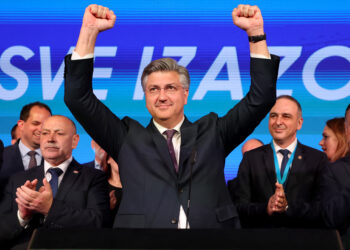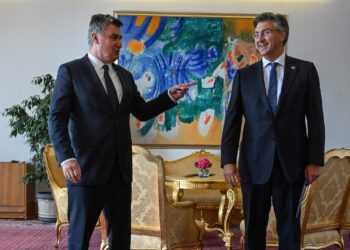Brussels – All the signs emerged after the outcome of early elections on April 17, but now Croatia is poised to veer even further to the right. The ruling Croatian Democratic Union (HDZ) party decided to forge a governing alliance with the far-right nationalist Homeland Movement and, this morning (May 10), the outgoing prime minister Andrej Plenković announced with a post on X that he received a mandate from the President of the Republic, Zoran Milanović, to form the new cabinet of ministers and present it next week to the Sabor (the Croatian single-chamber Parliament) for a vote of confidence.
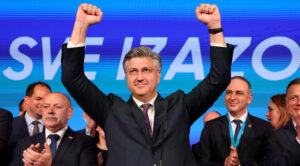
“Even in the third term, we will continue to work to improve” Croatia, Plenković exulted as he announced the 78 signatures (out of 151) of deputies who will support his third consecutive government since 2016. But the real difference from the past concerns precisely the political direction of his executive with the unprecedented majority partners. The Homeland Movement (DP) is a party founded in 2020 by radical nationalists and far-right conservatives who spilled out of Plenković’s Croatian Democratic Union because of its gradual shift toward centrist positions. After weeks of uncertainty after the April 17 elections, due to a fragmented political landscape, the party joining the European family of the EPP (European People’s Party) decided to veer decisively to the right, signing an agreement with the nationalists, a clear indication for the super election year in Croatia that will continue with the European elections (on June 9) and the presidential elections (in December).
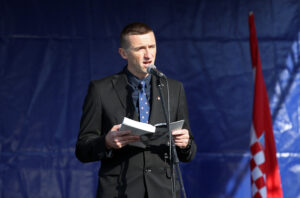
Homeland Movement President Ivan Penava (credits: Afp)
The Homeland Movement party is led by Ivan Penava, mayor of Vukovar, one of the centers of the eastern Slavonia region that was most devastated during the early stages of Croatia’s war of independence from Yugoslavia in 1991. Since its founding, the party has sought to provide the Croatian electorate – especially the rural one – with a more patriotic alternative and highly polarizing rhetoric on social and historical issues, in controversy with the internal restructuring of the HDZ to less nationalist positions by its chairman (since 2016), Plenković. Among those responsible for historical denial of Croatian war crimes during the wars in the former Yugoslavia in the 1990s and nostalgic for the Ustaša era (the Croatian nationalist and clerical-fascist movement led by Ante Pavelić, an ally of German Nazis and Italian fascists during World War II), most of its current members are the same who between 2016 and 2020 Plenković had neutralized or removed from the HDZ and who now find themselves holding the fate of the majority on which the new cabinet of the ‘moderate’ prime minister will depend.
The third Plenković government could undergo a reversal on the right to abortion – already a controversial issue in the country, even though by law it is guaranteed up to the tenth week – and on same-sex civil unions (legal since 2014), given the tough stance on this issue by Homeland Movement nationalists, who position themselves in favor of the Catholic Church’s greater weight in domestic politics to push traditional family and anti-abortion ‘values. There is also a risk of heightened ethnic tensions in Croatia, given the opposition of the new governing partners to the inclusion of the Serbian Independent Democratic Party (SDSS) in the majority, which supported the second Plenković government from 2020 to the present. In addition, there is uncertainty over the intentions of the HDZ leade after the June election round as, like Italian Prime Minister Giorgia Meloni, Plenković will lead his party in the European elections. It is unclear, however, whether he will stop at the push to elect as many MEPs as possible or seek a new role in Brussels (after serving as an MEP between 2013 and 2016). Eyes are particularly on the scenarios that could open up for the presidency of the European Commission if Ursula von der Leyen‘s candidacy falls through.
The turbulent 2024 in Croatia
Until the beginning of the year, Premier Plenković’s HDZ seemed headed for a quiet reappointment in the elections scheduled for the fall. Then, in early March, the government brought them forward before the June European elections to limit the political damage of the wave of protests in major cities across the country. In addition to pressure from individual professional groups over dissatisfaction with Plenković cabinet policies — from teachers to judges and doctors over salaries to journalists against changes to the Criminal Code to make it a crime to publish leaks — the center and left-wing parties catalyzed the desire to “defend democracy” in Croatia. In particular, protests focused on the appointment of Ivan Turudić as attorney general with the green light from Croatian deputies (the swearing-in took place on March 13) because of his proximity to the HDZ and the possibility he would protect Plenković from corruption cases should he lose his immunity after the election round.
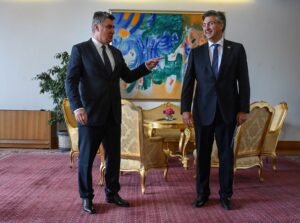
What disrupted the campaign, however, was President Milanović, who surprised voters by announcing his candidacy for Prime Minister as head of the Croatian Social Democrats. However, the Constitutional Court immediately declared Milanović’s candidacy unconstitutional if he did not first resign from the position he currently holds: a decision branded as “illiterate” by the President of the Republic, who continued to tour the country to campaign for the SDP and the center-left coalition. The President of the Republic, in office since 2020 and former premier between 2011 and 2016, is the most popular political figure in Croatia. However, his ambiguous rhetoric towards Russia and the war in Ukraine, as well as that on his relationship with the leader of Republika Srpska (the Serb-majority entity in Bosnia and Herzegovina), Milorad Dodik, and with the Hungarian prime minister, Viktor Orbán, make him a loose cannon for the younger, more progressive electorate.
Find more insights on the Balkan region in the BarBalkans newsletter hosted by Eunews
English version by the Translation Service of Withub